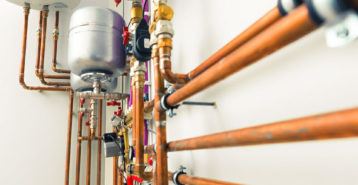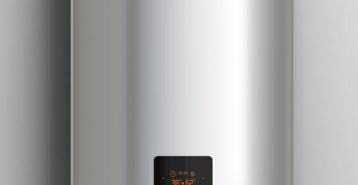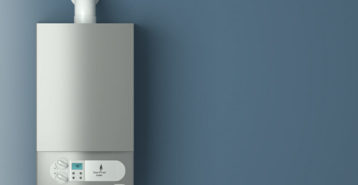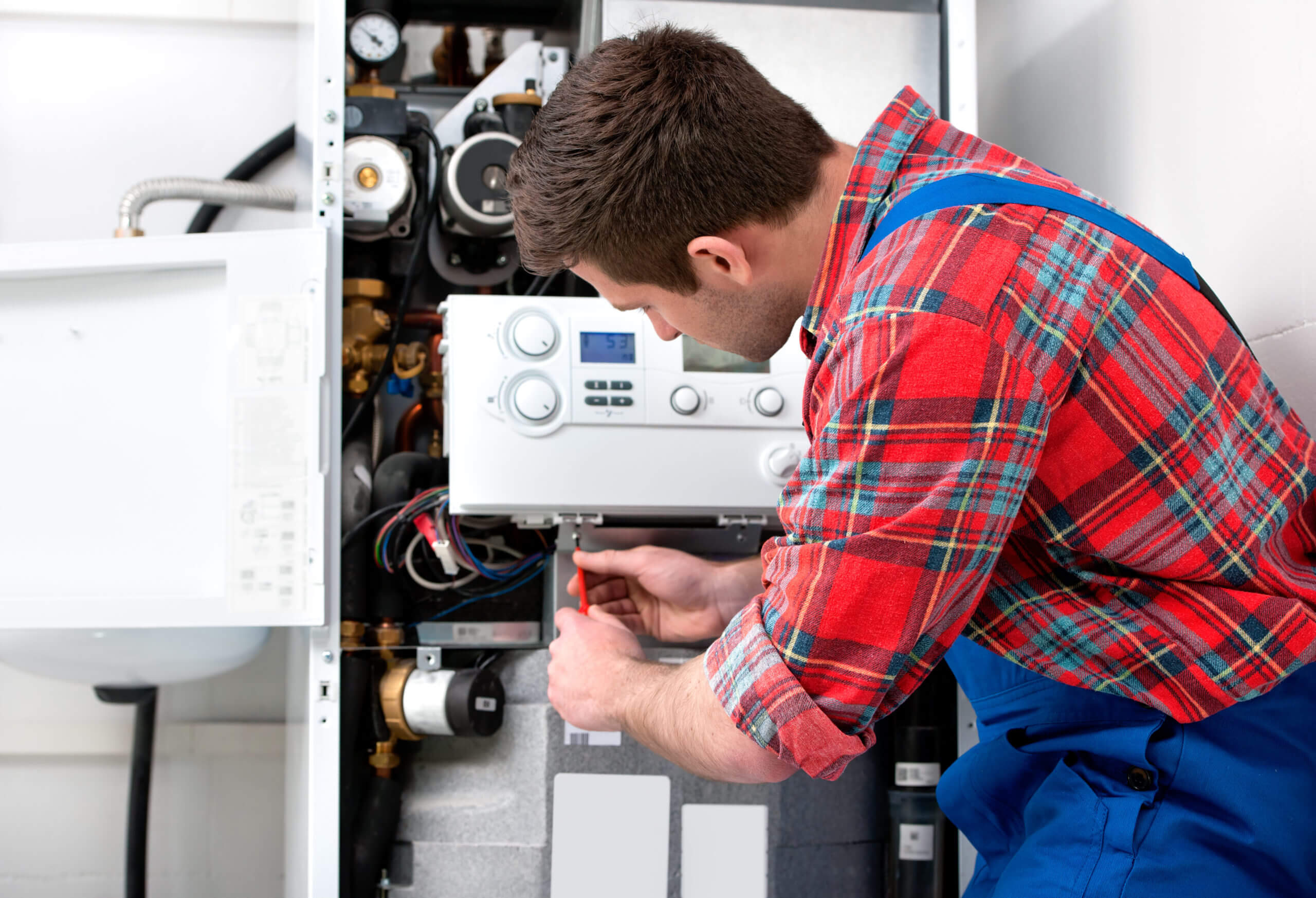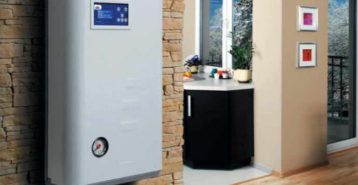Oil Boiler Installation: Costs, Comparisons, and Alternatives
If your home relies on an oil boiler for heating, understanding how these systems work — and how much they cost to install, replace, and operate — can help you make smarter decisions about your comfort and budget. Oil boilers remain a common choice in many U.S. households, especially in regions without access to natural gas, but they can be expensive to run and maintain.
In this guide, we’ll break down everything you need to know, from average replacement and installation costs to operating expenses, brand comparisons, and alternatives like gas boilers, electric systems, and heat pumps.
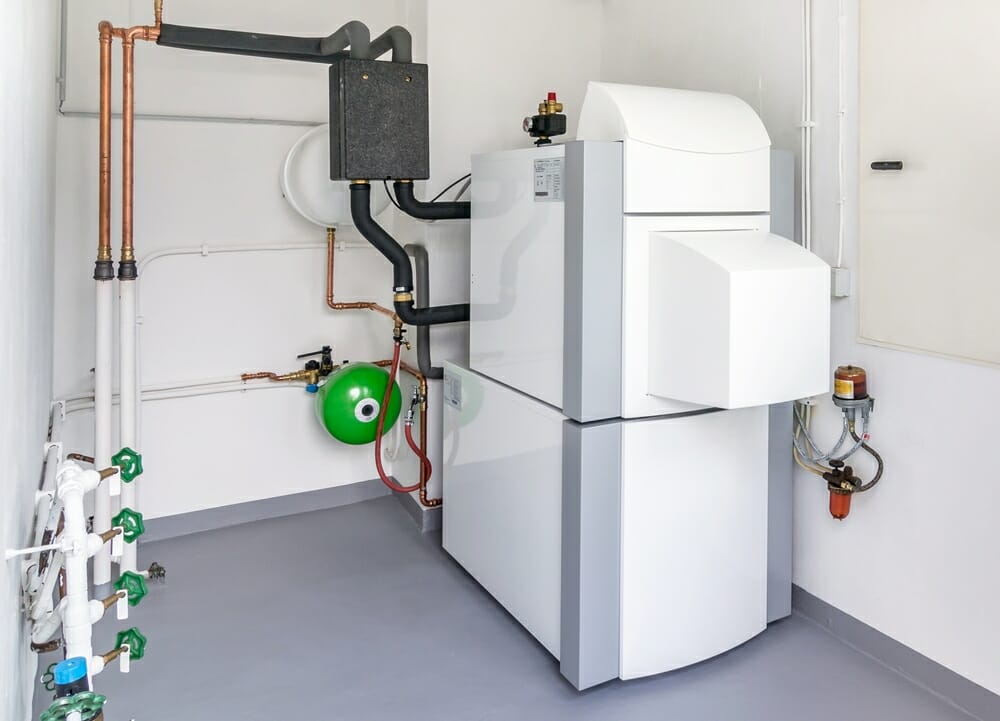
How Does an Oil Boiler Work?
An oil boiler is a type of boiler unit that heats your home by burning heating oil. The system pumps oil from a storage tank into the boiler’s combustion chamber, where it’s ignited. This process heats water, which is then circulated through radiators, baseboards, or radiant floor systems. Some oil boilers also provide domestic hot water.
Key Points:
- Requires an oil storage tank on-site.
- Delivers consistent heat in colder climates.
- Works with traditional radiator systems or hydronic heating.
- Less efficient than natural gas but still common in rural areas without gas lines.
How Much Does It Cost to Replace or Install an Oil Boiler?
Replacing an existing oil boiler costs $4,500 to $12,000 on average in the U.S. as of 2026. Costs trend higher if your home needs extra work like chimney lining, new venting, or oil tank replacement.
The cost of replacing or installing an oil boiler can vary depending on the system type, home size, labor rates in your area, and whether you’re replacing an existing unit or installing one for the first time. Below is a detailed breakdown of price ranges by top influencing factors, system type and size, brand differences, and the additional expenses homeowners should budget for.
Oil Boiler Replacement Cost
Replacing an existing oil boiler typically costs $4,500 to $9,000. Costs trend higher if your home needs extra work like chimney lining, new venting, or oil tank replacement.
Factors that impact replacement costs:
- Size of the boiler needed for your home
- Efficiency rating (standard vs. high-efficiency models)
- Complexity of removal of the old system
- Regional labor rates
Expected Cost Range:
- Low end: $4,500 (small, standard-efficiency replacement)
- High end: $9,000 (large, high-efficiency replacement with upgrades)
Oiler Boiler Installation Cost (New System)
Installing a new oil boiler system typically costs $7,500 to $12,000 and is generally more expensive than a replacement. This is because a first-time install often requires:
- Installing an oil storage tank
- Running new fuel lines and piping
- Updating venting or adding a chimney liner
- Pulling permits and passing inspections
Expected Cost Range:
- Lower end: $7,500 (smaller home, standard boiler)
- Higher end: $12,000+ (large home, high-efficiency boiler, full system setup)
Cost by Type of Oil Boiler
Different boiler types carry different price tags based on efficiency, complexity, and functionality.
Standard Efficiency (Non-Condensing)
Average Costs:
- Replacement: $3,500 to $6,500
- New Installation: $5,500 to $8,500 (includes tank/piping setup if not already in place)
Best For:
- Smaller homes with modest heating demands
- Homeowners on a tighter budget
- Short-term ownership situations where long-term energy savings aren’t a priority
Why Choose It:
- Lowest upfront cost compared to other boiler types
- Simpler design means fewer parts to maintain
- Reliable performance for homes that don’t experience extreme winters
Downsides:
- Lower efficiency means higher annual fuel bills (may consume 15% to 25% more oil than a high-efficiency unit)
- Less eco-friendly due to higher emissions
- Savings on upfront costs can be offset by higher operating costs over time
High-Efficiency (Condensing)
Average Costs:
- Replacement: $6,000 to $11,000
- New Installation: $8,500 to $12,000+ (due to additional venting requirements and system upgrades)
Best For:
- Medium to large homes with high heating demands
- Homeowners planning to stay in their property long-term
- Areas with high heating oil prices, where efficiency savings have the biggest impact
Why Choose It:
- Can reduce annual fuel consumption by 15% to 25% compared to standard units
- Lower long-term heating bills, especially in cold climates
- Eco-friendlier option with reduced emissions
Downsides:
- Higher upfront cost than standard boilers
- More complex system, which can lead to higher repair and maintenance costs
- Requires proper installation and venting to maximize efficiency benefits
Combination (Heating + Hot Water)
Average Costs:
- Replacement: $7,000 to $12,000
- New Installation: $9,500 to $14,000+ (includes hot water integration, tank setup, and venting upgrades)
Best For:
- Homes that need both heating and hot water from one unit
- Households with multiple bathrooms or high hot water demand
- Properties with limited space where a separate water heater isn’t practical
Why Choose It:
- Provides both heat and hot water in a single system
- Saves space by eliminating the need for a separate water heater
- Convenient “all-in-one” solution for families with high hot water needs
Downsides:
- Most expensive option to install and replace
- If the boiler breaks down, you lose both heating and hot water
- Requires careful sizing to ensure adequate hot water supply for larger households
Cost by Popular Brands
Some top-rated boiler brands come with higher upfront costs but deliver benefits like better warranties, stronger efficiency ratings, and longer lifespans.
Average Cost by Top 3 Brands:
- Weil-McLain: $2,100 to $8,000
- Buderus: $1,800 to $5,000
- Burnham: $2,150 to $5,500
When choosing an oil boiler brand, balance cost, efficiency, warranty, and local availability. Budget-conscious homeowners may prefer Burnham for affordability, while those seeking long-term savings and top efficiency often go with Buderus. Weil-McLain offers a reliable middle ground with strong contractor support across the U.S. Ultimately, the best choice is the brand your local HVAC contractor can install and service efficiently.
Cost by Region and Home Size
The size of your home and the heating demands of your region directly affect the oil boiler size you need (measured in BTUs) and expected cost to install.
Below, you can determine the unit size you need and average installation cost based on your region and home size.
| Region | Climate Zone | BTUs per Sq. Ft. | Example Home Size | Average Installation Cost |
| Northeast | Cold/Very Cold | 50 to 60 BTU | 1,500 sq. ft. | $7,500 to $9,000 |
| 2,500 sq. ft. | $10,000 to $12,000+ | |||
| Midwest | Mixed/Cold | 45 to 55 BTU | 1,500 sq. ft. | $6,500 to $8,000 |
| 2,500 sq. ft. | $8,500 to $10,500 | |||
| South | Warm | 30 to 40 BTU | 1,500 sq. ft. | $5,000 to $6,500 |
| 2,500 sq. ft. | $7,000 to $8,500 | |||
| West Coast | Mild/Marine | 30 to 40 BTU | 1,500 sq. ft. | $5,500 to $7,000 |
| 2,500 sq. ft. | $7,500 to $9,000 |
Labor Costs
The labor required to install an oil boiler usually accounts for 30% to 50% of the total bill. HVAC contractors typically charge $75 to $150 per hour, and installation usually takes 12 to 20 hours. Labor costs can depend on the complexity of venting and piping, whether an old system needs removal, the contractor’s experience, and the regional labor market.
Additional Costs to Consider
On top of the boiler itself, homeowners should budget for common add-on expenses.
- Oil storage tank replacement: $1,500 to $4,000 (if the old one is corroded or leaking)
- Chimney liner or venting upgrades: $500 to $2,000 (needed for proper exhaust)
- Removal/disposal of old boiler: $500 to $1,000
- Permit fees & inspections: $100 to $500 (required in many municipalities)
What Is the Cost to Operate an Oil Boiler?
Oil boilers are one of the most expensive heating systems to operate, typically costing $3,000 to $6,500 per year depending on local fuel prices and efficiency.
Annual operating costs depend on:
- Fuel prices: Heating oil averages $3.50 to $5.50 per gallon (varies by state).
- Consumption: A typical home uses 800 to 1,200 gallons per year
- Maintenance: Annual tune-ups cost $150 to $300.
Tip: A high-efficiency boiler can reduce fuel consumption by 15% to 25%, lowering yearly bills.
By comparison, a natural gas boiler usually costs about half as much at $1,500 to $3,500 annually, while electric boilers fall in the middle at $2,500 to $5,000, though they can be far less efficient in colder climates. Heat pumps offer the lowest operating costs, with air-source models averaging $1,200 to $3,000 per year and geothermal systems running as little as $800 to $2,500 annually, though both come with higher upfront installation costs.
Overall, oil remains reliable for off-grid homes, but gas and heat pumps are generally more economical long-term.
When Is It a Good Idea to Switch From an Oil Boiler?
While oil boilers provide reliable heat, especially in off-grid homes, they’re also among the most expensive systems to operate. Homeowners often save money in the long run by switching to gas or a heat pump system. The key is knowing when the investment makes financial sense.
When Switching Makes Sense:
- High Heating Oil Prices in Your Region: If oil costs exceed $4 per gallon consistently, switching to gas or a heat pump can cut annual heating bills by 30% to 50%.
- Long-Term Homeownership Plans: If you plan to stay in your home at least 5 to 10 years, the savings on operating costs often offset the higher installation cost.
- Major System Replacement Needed: If your oil boiler is 15 to 20 years old or needs expensive repairs, it may be cheaper to invest in a new system that lowers ongoing costs.
- Access to Natural Gas Lines: Homes with available gas lines can achieve ROI in as little as 3 to 5 years after switching to a gas unit.
- Mild to Moderate Climates: Air-source heat pumps can pay for themselves in 5 to 7 years, while geothermal systems may take 10+ years but then provide extremely low long-term operating costs.
Compare top-rated HVAC pros in your area.
Read real homeowner reviews, explore qualifications, and view promotions. Modernize makes it easy to browse professionals and find one that will be perfect for your project.





